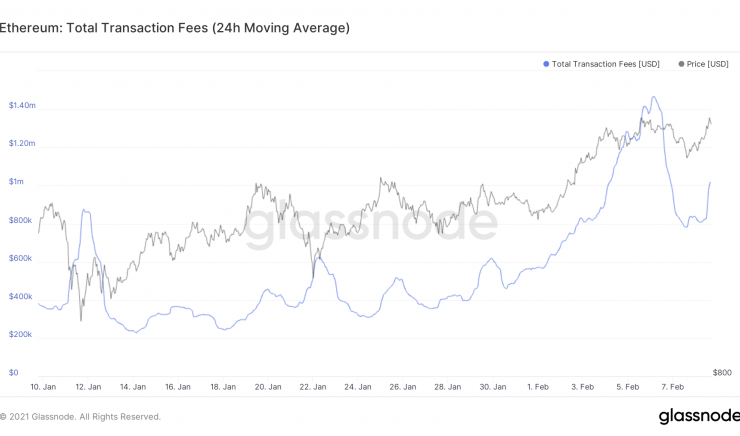Cardano (ADA) and polkadot (DOT) are now fourth- and fifth-most valued crypto assets, respectively, after they both surpassed XRP in market capitalization earlier Monday. That’s due to the recent rally in decentralized finance (DeFi) and the increased cost of using the Ethereum blockchain.
According to data from analytics site Messari, cardano’s market cap stands at approximately $21.82 billion while and polkadot’s is at roughly $19.83 billion. For XRP, that figure is about $16.36 billion.
The latest rally of the two cryptocurrencies of these public blockchains is not “idiosyncratic pumps,” according to investors and analysts who spoke to CoinDesk, but is a bet on these public blockchains’ “Ethereum-killer” narrative. Investors and traders are increasingly viewing Ethereum’s blockchain as too expensive and difficult to use while decentralized finance (DeFi), usually built on Ethereum, continues to boom.
Data from blockchain analytics firm Glassnode shows when ether’s price jumped after the CME launched its ether futures contract on Sunday, the Ethereum blockchain’s transaction fees started climbing again. On a 24-hour moving average, the network’s total transaction fees, as of 14:00 UTC (9 a.m. ET) Monday, Feb. 8, was at $1,003,727.15.
“[Ethereum] is seemingly too clogged,” Mable Jiang, a principal at crypto investment firm Multicoin Capital. “[Cardano and Polkadot] fit into the larger narrative of ‘seeking for a scalable blockchain,’ so if the capital within the crypto capital market is looking for some latest narrative to shill, this is it.”
Helping to drive the latest ether rally is the explosive DeFi sector; approximately $36.13 billion is locked in DeFi at the moment, per DeFI Pulse data. The majority of top DeFi protocols by market capitalization are based on Ethereum including Aave, Uniswap, Maker, Synthetix and Compound.
Using the Ethereum network has become more expensive, and it’s not just because of DeFi. According to Jiang, another factor is bitcoin’s latest rally to a new all-time high earlier Monday after U.S. electric car manufacturer Tesla (NASDAQ: TSLA) announced its purchase of $1.5 billion of bitcoin.
“Right now, there’s such a big rally because of Tesla’s disclosure, and if people are going to close their short position on ether, they’d pay $50-$100 [worth of] gas [fee] per transaction probably,” Jiang said. “This is no longer affordable [for] any small-size retailers” using decentralized derivatives platforms.
In the hour leading up to press time, the average gas price was 307 gwei, according to gas fee tracker gasnow.org, which is powered by Ethereum mining pool Sparkpool. “Gas” refers to the internal pricing unit for running transactions on Ethereum and is denoted in gwei, which is equal to one billionth of an ether.
Read More: Ethereum Futures Are Now Trading on CME
A report published earlier this month by crypto venture capital firm Outlier Ventures noted that Cardano is the second-most actively developed protocol behind the Ethereum blockchain, while Polkadot has doubled the number of monthly active core developers between last July and November.
“Given the market focus on all things DeFi, one would be forgiven for missing the recent Cardano upside but the underlying fundamentals are very supportive,” Denis Vinokourov, head of research at Bequant, said. “Equally, Polkadot was also highlighted as another actively developed protocol and its interoperability play and venturing into DeFi is well documented.”
On a year-to-end basis, cryptocurrencies of other major smart contract platforms have also seen significant growth. Solana (SOL), cosmos (ATOM) and algorand (ALGO) were up 320.3%, 141.4%, and 130.81%, respectively, according to Messari.




Comments (No)